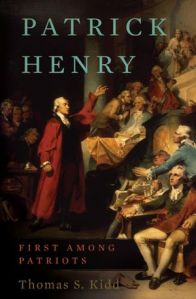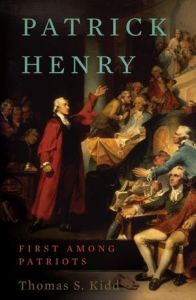 Thomas S. Kidd, Patrick Henry: First Among Patriots (New York: Basic Books, 2011). $28.00, 320 pages.
Thomas S. Kidd, Patrick Henry: First Among Patriots (New York: Basic Books, 2011). $28.00, 320 pages.
To be honest, I didn’t know much about Patrick Henry before I read Thomas S. Kidd’s biography of him. I knew—as all schoolboys should know—that he uttered the famous line, “give me liberty, or give me death.” I also knew that his support for a general assessment for religion—taxpayer funded clergy support—in Virginia provoked James Madison’s Memorial and Remonstrance. And finally I knew that Henry, an anti-Federalist, opposed the ratification of the U.S. Constitution. I didn’t know much else, and I didn’t know how to connect what little knowledge I had of Henry into a consistent picture of the man.
The merits of Kidd’s biography are that it filled out my knowledge of Patrick Henry’s and explained why his political vision was more or less consistent. Kidd uses the term Christian republicanism to describe Henry’s politics, which I might summarize as a faith-based practice of ordered liberty. Henry’s belief in liberty explains his early advocacy of the cause of Independence, as well as his opposition to the Constitution, which he felt aggrandized the Federal government with too much power. His belief in order—not merely “law and order,” but the kind of moral self-government that arises from religious practice—led him to support the general assessment for religion. This general assessment was denominationally non-specific: In other words, the taxpayer could direct his assessment to the church of his choice. Henry believed that such an assessment was necessary to the support of Christian churches, which he in turn felt were vital to the health of the American republic. Ironically, it is James Madison’s view of religious disestablishment, not Henry’s quasi-establishmentarianism, that has turned out to best promote the health of Christianity in America.
Like many Founders, Henry was not always consistent with his own moral principles. As a Christian republican, he felt that virtue was necessary to the health of a free society. And yet, as Kidd shows, Henry—always concerned with his family’s financial health—was not above engaging in instances of morally dubious land speculation. More critically, Henry owned slaves in his lifetime and did not provide for their manumission after his death. Henry knew that the practice of slavery was problematic. As he wrote to Virginia Quaker leader (and abolitionist) Robert Pleasants: “Would anyone believe that I am a master of slaves of my own purchase! I am drawn along by the general inconvenience of living without them. I will not, I cannot justify it…” [emphasis added].
Reading about Patrick Henry—or about any of the Founders—reminds us to avoid the twin dangers of easy hagiography and easy demonology. Patriotic renderings focus on his advocacy of liberty, while critics point to his hypocrisy on slavery. The value of good biography is to bring these two realities of Henry’s life into tension, and Kidd’s book is nothing if not good biography.
P.S. If you found my review helpful, please vote “Yes” on my Amazon.com review page.


Thanks for this review. I may buy the book.